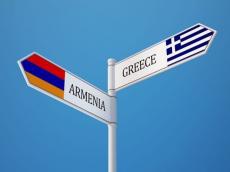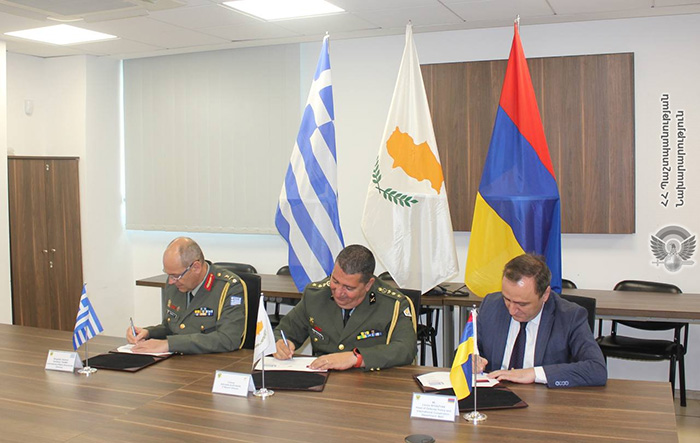|
|
TODAY.AZ / Politics
Greece repeats France's blunder in pursuing dangerous policy towards S Caucasus
06 March 2024 [15:21] - TODAY.AZ

The reason for Armenia's special interest in Greece in recent days is causing several questions. The Armenian Ambassador to Greece Tigran Mkrtchyan's meeting with Greek Minister of National Defence Nikos Dendias last week, the Greek minister's visit to Armenia, Armenian Prime Minister Nikol Pashinyan's visit to Greece with his wife right after the Munich Conference, and Greek Prime Minister Misotakis's claims on Greece's support for the Armenian side to achieve a peace agreement with Azerbaijan and the expression "to disrupt the dictator's plans in the region" and making insinuations against Azerbaijan indicate that this country is going to act as France's new puppet in the South Caucasus.
The prejudice against Turkic nationalities prompts Greece to create an anti-Azerbaijani coalition and involve Armenia in the France-Greece-Cyprus union.

We should not forget that the military cooperation between these countries began many years ago, when the Azerbaijani lands were still under Armenian occupation. President Ilham Aliyev touched on this issue when he received the Greek ambassador on September 2, 2020, and expressed the concern of official Baku. However, it seems that Azerbaijan's views on this issue are not clear enough to the other side, so a tripartite programme on military cooperation was signed between Armenia, Greece, and Cyprus last year.
As a matter of fact, Greece, which is a partner of Armenia with an anti-Turkish spirit, has a character completely compatible with Armenians. For a long time, Armenia and Greece have declared their desire to normalise relations with Azerbaijan and Turkiye. Making such claims and holding numerous meetings is known as hypocrisy and imbalance. Greece, like Armenia, has been harbouring Turkish hatred for a long time and has taken biased steps against Azerbaijan and Turkiye, aiming at completely different goals in practice.
This time, seeing itself alone on the field, France planned to add Greece to its league, which could support a weak ally. France knows that entering the South Caucasus is not an easy task for it. It is also an executor of the secret mission of the West.
But while France and the West were able to woo Armenia with sweet promises, the inability of its mediator to be a strong enough player necessitated the entry of a third party and possibly even a fourth party, including Cyprus.
Undoubtedly, Armenians who do not care about the security and future of the South Caucasus joining the France-Greece-Cyprus trio and building an alliance against Azerbaijan may pose a serious threat in the region in many terms. Armenia's blind step does not create rifts between Europe, the West, and Azerbaijan, on the contrary, it further distances the West from the South Caucasus. Europe understands very well that the main key to the South Caucasus is in the hands of Azerbaijan, both economically and politically, and in this case, its support for Armenia undermines the interests of the West.
Over time, the West and Europe will understand that this path is wrong in order not to lose Azerbaijan. In the middle, the loser will be Armenia, as always.
In the end, Greece will be left with belated regret and the "France's tool" stigma. We remember which country Greece and Cyprus were with during the Patriotic War in 2020 and their military and medical assistance to the separatists who were illegally fighting in Garabagh. Just as Greece wants to strengthen its relations with Turkiye, Armenia is also chasing these dreams. However, the paths of both allies cross at one point: Turkey and Azerbaijan. Armenia well remembers that its 30-year occupation policy left Yerevan deprived of access to the borders of Turkiye.
Azerbaijan does not have an aggressive approach towards any country. Especially last year, during the meeting of the Minister of Foreign Affairs of Azerbaijan, Jeyhun Bayramov, with the Minister of Foreign Affairs of Greece, Giorgos Gerapetritis, within the framework of the Eastern Partnership Foreign Affairs Ministerial meeting, the parties confirmed that Azerbaijan is a reliable and strategic partner of Europe in the field of energy security.
While the two countries (Greece and Azerbaijan) are confident that successful cooperation in the field of energy will contribute to the development and stability of the region, Athens' current policy seems to be a potential threat to the steps that Armenian-Azerbaijani relations can take in the direction of peace.
URL: http://www.today.az/news/politics/245649.html
 Print version
Print version
Connect with us. Get latest news and updates.
See Also
- 23 December 2024 [15:19]
Justice Ministry and BSU to collaborate on probationer rehabilitation and support - 23 December 2024 [13:27]
Common map of the Turkic world is being created - 23 December 2024 [12:21]
President: Azerbaijan is one of the unique destinations where different civilizations converge - 23 December 2024 [12:16]
President Ilham Aliyev sends congratulatory letter to Pope Francis - 23 December 2024 [12:12]
Azerbaijan’s strength lies in preserving multiculturalism and national values, says chairman - 23 December 2024 [12:05]
President Ilham Aliyev: Our country free from discrimination or conflict on religious grounds - 23 December 2024 [11:11]
Gloveman: Macron and his one-time premieres - 23 December 2024 [11:00]
Pashinyan plants a pig for the Armenians - 23 December 2024 [10:22]
Azerbaijani Foreign Minister visits Serbia - 23 December 2024 [10:00]
Shusha welcomes returning IDPs
Most Popular
 IDPs return to rebuilt Shusha as part of Great Return State Program
IDPs return to rebuilt Shusha as part of Great Return State Program
 Pashinyan plants a pig for the Armenians
Pashinyan plants a pig for the Armenians
 Azerbaijan, Russia inks agreement on Development of Transit Freight Transportation
Azerbaijan, Russia inks agreement on Development of Transit Freight Transportation
 Sweden's Climate and Environment Minister calls for Shein and Temu to be banned in country
Sweden's Climate and Environment Minister calls for Shein and Temu to be banned in country
 President Ilham Aliyev's remarks in his interview with Dmitry Kiselev in spotlight of world media
President Ilham Aliyev's remarks in his interview with Dmitry Kiselev in spotlight of world media
 S. Korea to launch 3rd homegrown military spy satellite
S. Korea to launch 3rd homegrown military spy satellite
 U.S. finalizes US$4.7 bln in CHIPS Act subsidy to Samsung Electronics
U.S. finalizes US$4.7 bln in CHIPS Act subsidy to Samsung Electronics
